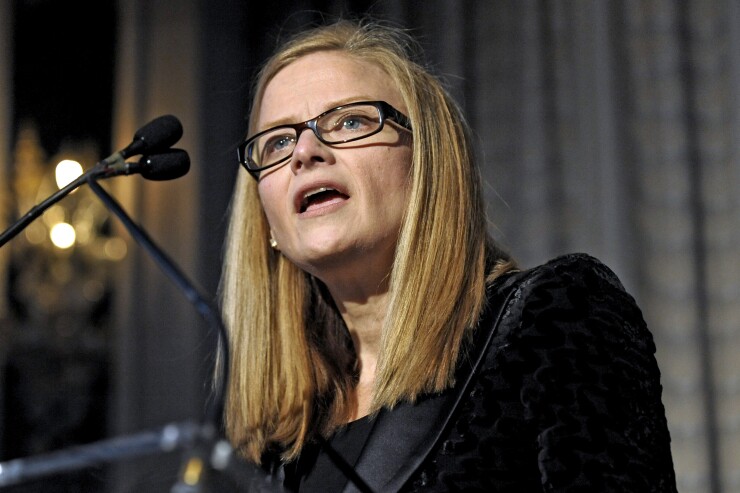
LOS ANGELES — Carrie Tolstedt, Wells Fargo's former head of its community bank, entered a "not guilty" plea at an arraignment hearing on Friday, kicking off a legal battle that could result in prison time for the accused.
Tolstedt stood before District Court Judge Josephine L. Staton at the federal courthouse in downtown Los Angeles and entered a plea of "not guilty," to the criminal charge of obstructing a bank examination. If found guilty, Tolstedt would become the highest-ranking executive at Wells Fargo to go to prison for the
Prosecutors said Tolstedt failed to disclose to federal bank examiners the number of Wells Fargo employees who had been fired or resigned for opening millions of bank accounts without customer authorization.
On Friday, Tolstedt, 63, stood before Judge Staton and agreed to waive her right to be indicted by a grand jury, and agreed to the conditions of her release on a $25,000 unsecured bond. The hearing took less than 10 minutes. Tolstedt's "not guilty" plea starts the administration process that will end in 10 weeks with her sentencing.
"Ms. Tolstedt, have you read this information," Judge Staton asked at the hearing, saying: "And I'm not asking you to admit or deny anything right now, but do you understand the contents of what the government is saying that you did?"
"Yes," Tolstedt replied.
Last month, Tolstedt entered into a plea agreement with the U.S. Attorney's Office for the Central District of California, in which she agreed to plead "guilty" to the single obstruction charge in exchange for prosecutors setting an upper limit of prison time. The law for obstruction of a bank examination allows for a broad sentence of up to five years, but the plea deal limits the statutory maximum sentence, or "statmax," to 16 months, said Ranee A. Katzenstein, a 25-year veteran of the U.S. Attorney's Office, assistant U.S. attorney and chief of the major frauds section. The guideline range is between 10 to 16 months.
The plea agreement has not yet been approved by Judge Staton. The district court will refer Tolstedt's "not guilty" plea to the U.S. Probation and Pretrial Services System, which prepares a presentence report that will be the subject of the next hearing, prosecutors said. Staton set a status conference for May 19, and a trial date of May 30.
Tolstedt is being prosecuted by Assistant U.S. Attorney Alexander B. Schwab. The case's ultimate resolution is the result of years of work by multiple agencies investigating corporate misconduct, a focus of the Department of Justice under Attorney General Merrick Garland.
After the scandal explodes, Wells Fargo's former chief security officer embarks on a long journey into the legal system.
Meanwhile, Tolstedt spent much of the hearing signing papers and conferring with her attorney Matthew Umhofer, managing partner at Umhofer, Mitchell & King and a former assistant U.S. attorney.
The prospect of a high-ranking former banker actually going to prison comes at a particularly inauspicious time for the banking industry. The
Back in 2016, just months before the first settlement was announced, Wells gave Tolstedt a golden parachute in which she was allowed to retire with $125 million of stock and options, including a $5.5 million incentive bonus the year the scandal broke. Some of it was ultimately clawed back.
Last month, Tolstedt agreed to pay a
Prosecutors said Tolstedt was aware of sales practices misconduct between 2004 and 2006, when employee firings linked to sales goals began rising. Wells has settled more than $3 billion in fines. The San Francisco bank
The obstruction charge that Tolstedt faces stems from a memo that she and other Wells executives prepared for the risk committee of the bank's board of directors in May 2015. Even though the memo was written for a board committee,
The scandal was first uncovered by former Los Angeles Times Reporter E. Scott Reckard, whose 2013
Tolstedt was Wells Fargo's senior executive vice president of community banking and headed the community bank during the time that the aggressive sale practices and firings took place.
On Friday, when Tolstedt first entered the nearly-deserted courthouse with her husband, she was stopped by a security guard after a beep went off at the metal detector. The guard ruffled through her belongings and repeatedly sent her wallet through the metal detector. The guard ultimately pulled out a metal credit card that had set off the alarm.






